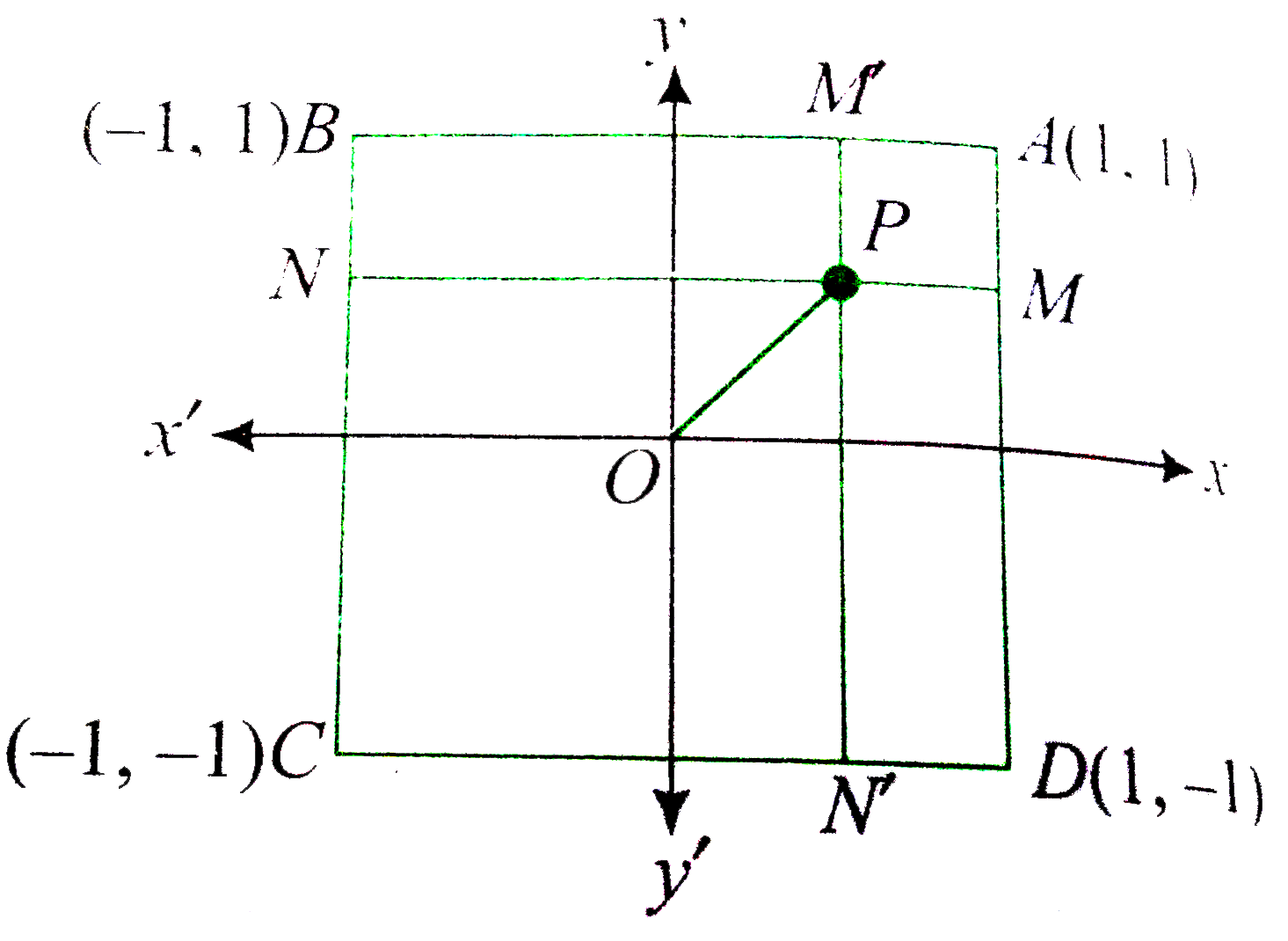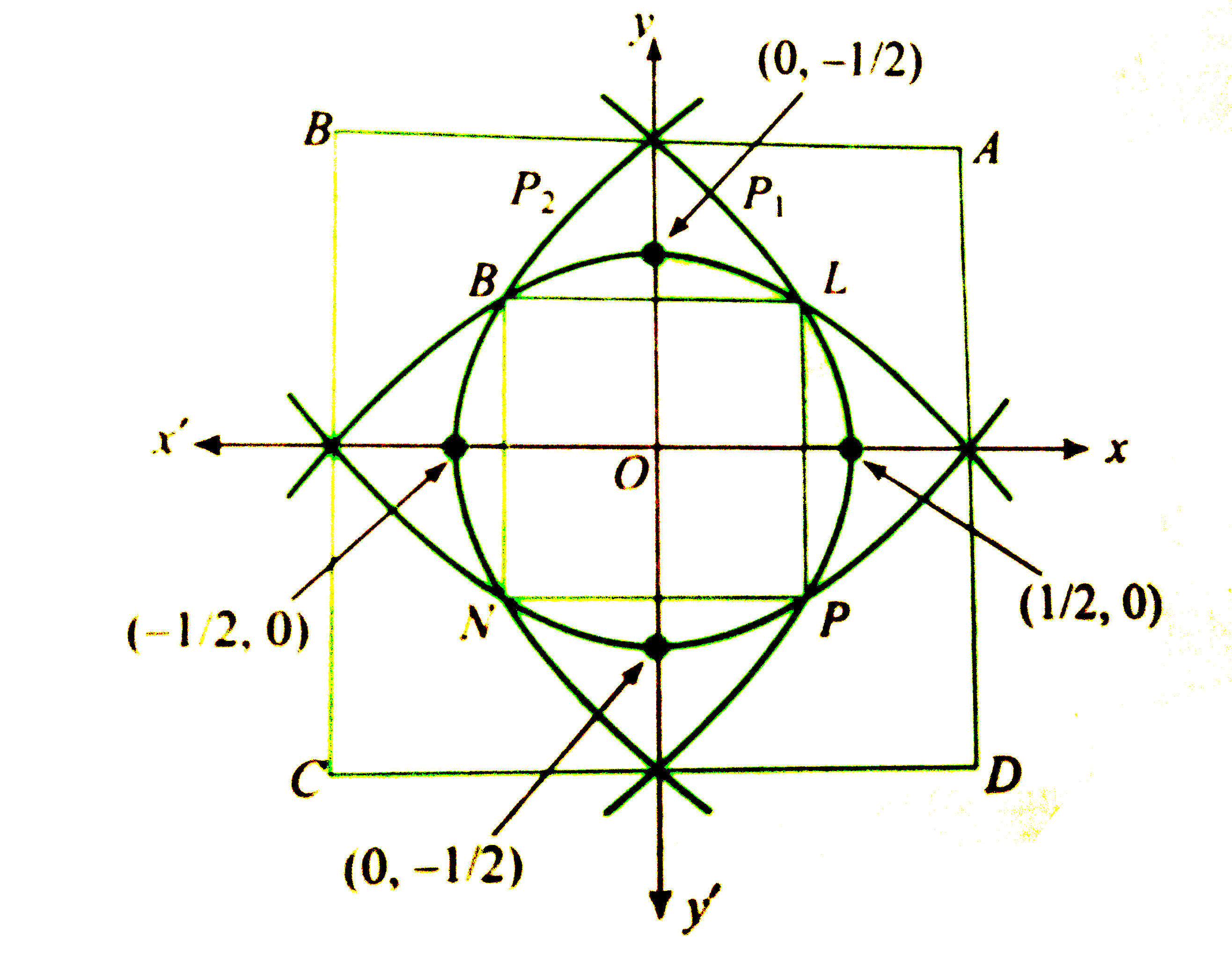Consider a square with vertices at (1,1),(−1,1),(−1,−1)and(1,−1). Let S be the region consisting of all points inside the square which are nearer to the origin than to any edge. Sketch the region S and find its area.

Let us consider any point (x,y) inside the square such that its distance from origin is less than its distance from any of the edges. Consider edge AD. Therefore,
OP<PM
⇒ √(x2+y2)<1−xory2<−2(x−12) (1)
Above represents all points within the parabola y2=1−2x.
If we consider the edge BC, then OP<PN will imply
y2<2(x+12) (2)
Similarly, if we consider the edges AB and CD, we will have
x2<−2(y−12) (3)
x2<2(y+12) (4)
Hence, S consists of the region bounded by four parabolas meeting
the axes at (±12,0)and(0,±12)
The point L is intersection of P1andP3 given by (1) and (3).

Solving, we get
y2−x2=−2(x−y)=2(y−x)
or y−x=0
or y=x
⇒ x2+2x−1=0
or (x+1)2=2
or x=√2−1 as x is + ve
∴ L is (√2−1,√2−1).
∴ Total area = 4[Square of side (√2−1)+2∫1/2√2−1√1−√2xdx]
=4{(√2−1)2+2∫1/2√2−1√(1−2x)dx}
=4[3−2√2−23{(1−2x)3/2}1/2√2−1]
=4[3−2√2−23{0−(1−2√2+2)3/2}]
=4[3−2√2+23(3−2√2)3/2]
=4(3−2√2)[1+23√(3−2√2)]
=4(3−2√2)[1+23(√2−1)]
=43(3−2√2)(1+2√2)=43[(4√2−5)]
=16√2−203 sq. units.
Topper's Solved these Questions
- BOOK - CENGAGE ENGLISHCHAPTER - AREAEXERCISE - Solved Examples10videos
AREA
- BOOK - CENGAGE ENGLISHCHAPTER - AREAEXERCISE - Concept Application Exercise 9.19videos
AREA
- BOOK - CENGAGE ENGLISHCHAPTER - APPLICATIONS OF DERIVATIVESEXERCISE - Comprehension Type5videos
APPLICATIONS OF DERIVATIVES
- BOOK - CENGAGE ENGLISHCHAPTER - BINOMIAL THEOREMEXERCISE - Matrix4videos
BINOMIAL THEOREM
Similar Questions
Consider a square with vertices at (1,1),(−1,1),(−1,−1),and(1,−1). Set S be the region consisting of all points inside the square which are nearer to the origin than to any edge. Sketch the region S and find its area.
View SolutionConsider a square with vertices at (1,1),(−1,1),(−1,−1),and(1,−1). Set S be the region consisting of all points inside the square which are nearer to the origin than to any edge. Sketch the region S and find its area.
View SolutionProve that the points (2, -1), (4, 1), (2, 3) and (0, 1) are the vertices of a square.
View SolutionShow that the points (1,7),(4,2),(−1,−1)and(−4,4) are the vertices of a square.
View SolutionShow that the points A(2,1),B(0,3),C(−2,1)andD(0,−1) are the vertices of a square.
View SolutionShow that the points (1, 7), (4, 2), (−1, −1) and (−4, 4) are the vertices of a square.
View SolutionLet O(0,0),A(2,0),andB(11√3) be the vertices of a triangle. Let R be the region consisting of all those points P inside OAB which satisfy d(P,OA)≤min[d(p,OB),d(P,AB)] , where d denotes the distance from the point to the corresponding line. Sketch the region R and find its area.
View SolutionSketch the region bounded by the curves y=√5−x2 and y=|x−1| and find its area.
View SolutionThe area of the region bounded by the curve y=|x−1| and y=1 is:
View SolutionShow that the points A (5, 6), B(1,5), C(2, 1) and D(6, 2) are the vertices of a square ABCD.
View Solution

